7. Oceania
The Pacific island countries are not only Japan's “neighbors” that are bound by the Pacific Ocean, but which also have historical ties with Japan. Having an enormous Exclusive Economic Zone (EEZ), these countries are the cornerstone of Japan's maritime transport, and provide important pelagic fishing grounds. Therefore, the peace and prosperity of the Pacific island countries are important to Japan.
Meanwhile, many of the Pacific island countries are relatively new independent states that face the urgent task of becoming economically independent. In addition, they have common problems that are specific to small island countries, such as small economies dependent on primary industries, territories being geographically stretched across the sea, difficulty in access to the international market, and vulnerability to natural hazards. Based on this situation, Japan provides assistance for supporting their self-reliant and sustainable development, as a good partner with the Pacific island countries.
<Japan's Efforts>
In order to achieve political stability and self-reliant economic development in the Pacific island countries, it is crucial to overcome socio-economic vulnerabilities and to provide assistance for the entire region. In addition to promoting cooperation with the Pacific Islands Forum (PIF),(Note 12) a framework for regional cooperation composed of the Pacific island countries, Japan has been hosting the Pacific Islands Leaders Meeting (PALM), a summit meeting between Japan and the Pacific island countries every three years since 1997. Furthermore, the Ministerial Interim Meeting has been held every three years since 2010 midway between the PALMs, while the Japan-Pacific Islands Leaders Meeting has been held at the time of the UN General Assembly every year since 2014.
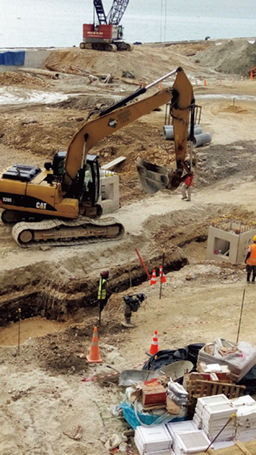
Site of the Port Vila Lapetasi International Wharf Development Project in Vanuatu. Excavation works are carried out for the installation of drainage pipes. (Photo: Mr. Takeda / ECOH CORPORATION)
In order to start preparing for PALM8, at the Third Ministerial Interim Meeting of PALM held in Tokyo in January 2017, discussions were held among the participating countries regarding follow-up to the support declared at PALM7 and cooperation, taking into account the common issues shared by Japan and the Pacific island countries, etc.
Based on the assistance package announced at PALM7, Japan is implementing bilateral cooperation, including developing basic infrastructures, such as ports, along with technical cooperation spread across several countries. For “disaster risk reduction,” as one of the priority areas of cooperation, Japan promotes mainstreaming disaster risk reduction, and extends comprehensive assistance for building disaster-resilient societies in the Pacific island countries. Drawing on Japan's expertise and experience, it provides support in such areas as training meteorological agency personnel of each country and developing appropriate evacuation systems for the residents.
Furthermore, to support the Pacific island countries in addressing climate change, Japan cooperates with the Secretariat of the Pacific Regional Environment Programme (SPREP), which is a regional international organization based in Samoa, to work on activities to train officials concerning countermeasures against climate change in their countries. In order to support Fiji, the presidency of the 23rd conference of the parties to the UNFCCC (COP23), the governments of Japan and Australia co-hosted the Pre-COP Workshop in Suva, the capital of Fiji in September 2017. This workshop was attended by government officials from small island countries, and discussions were held there on topics such as adapting to climate change, the relationship between climate change and security (vulnerability), and approaches to effective international frameworks, from a technical and practical perspective.
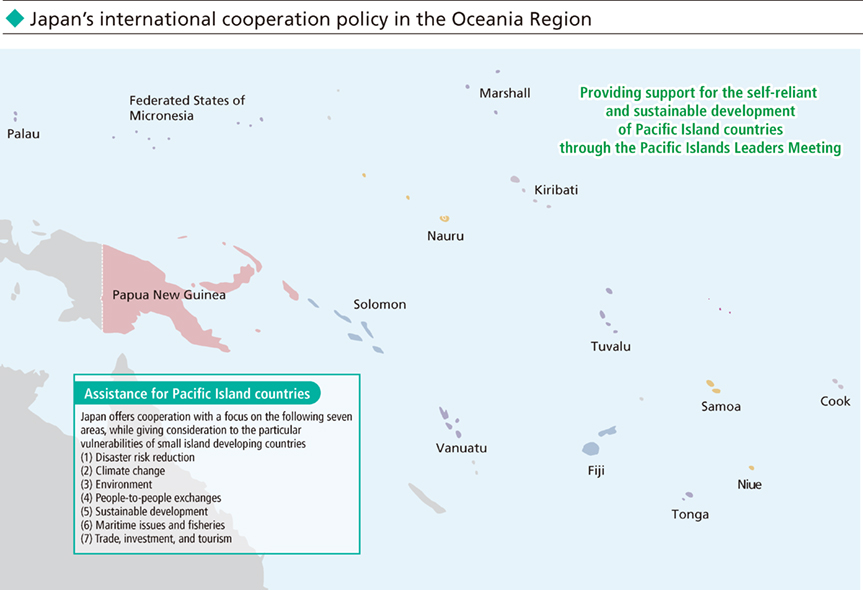
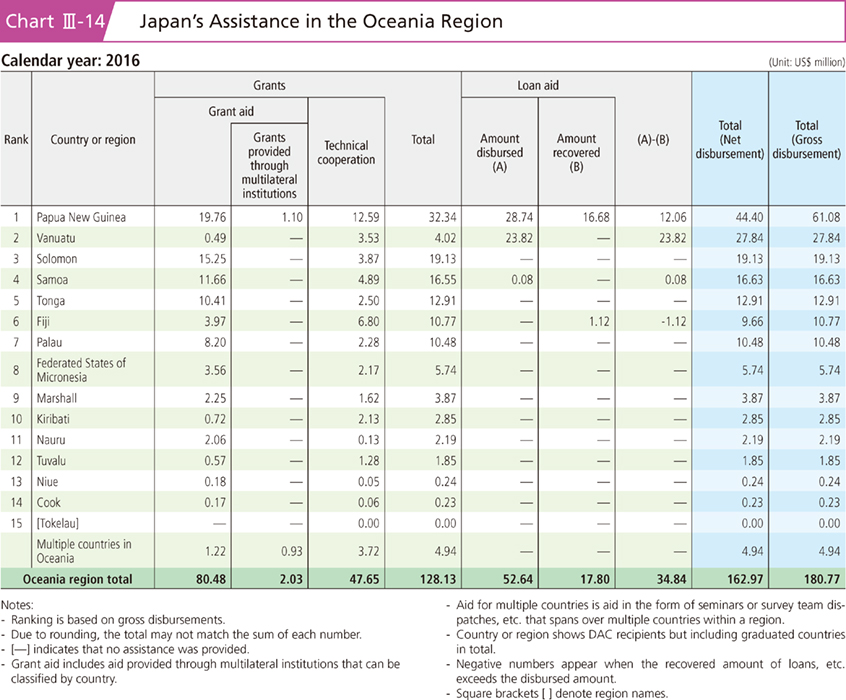
•Marshall
Assistance to the Republic of the Marshal Islands (RMI) in Response to the Drought Disaster
Grant Assistance for Grass-Roots Human Security Projects / Economic and Social Development Plan (2015 - )
The Marshall Islands is a country of low-lying atolls that are two meters above sea level on average, and dealing with vulnerability to natural disasters, including the damage from storm surges, is a major challenge. Additionally, droughts occur frequently in periods when there is small amount of rainfall. In recent years, the country has suffered from two serious droughts*1 in 2013 and 2016, but again in May 2017, another drought occurred in the northern atoll region. In each case a state of emergency was declared.
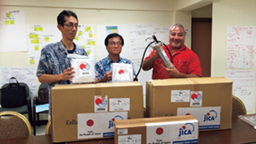
From the left: Acting Chief of JICA / JOCV Marshall Islands Office Ezaki, Ambassador Mitsuoka, Minister of Works, Infrastructure and Utilities Anthony M. Muller. They are each holding the recent aid supplies.
As the most part of land areas of the Marshall Islands are atoll islands consisting of coral, it is difficult to secure water. Therefore, the country relies on rain water for drinking and domestic water supply. Water shortages caused by droughts are a serious problem that involves people's lives. Since 2015, Japan has been implementing the “Project for Construction of Water Cistern in Mejit Island,” the “Project for Construction of Water Cistern at Jaluit High School in Jaluit Atoll,” and the “Project for Renovation of Classrooms and Water Cistern at Ine Elementary School in Arno Atoll” by Grant Assistance for Grass-Roots Human Security Projects, resulting in the construction and renovation of a total of three water cisterns.*2 This has improved the capacity of the respective regions to store water and thus enabled them to prepare for future droughts.
In addition, in February 2017 Non-Project Grant Aid for Provision of Japanese Small and Medium-Sized Enterprises Products was used to procure three seawater desalination units for within the grounds of Majuro Hospital in the capital city of Majuro. This means that even if outlying islands face water shortage due to droughts etc., it has now become possible to supply them with water produced using these seawater desalination units.
Countermeasures for climate change are one important component of Japan's development cooperation plan for the Marshall Islands, and combining Japan's grant aid schemes effectively is making it possible to undertake broad-ranging support that extends from support with preparing for disasters to support when disasters occur. (As of December 2017)
*1 Generally, the amount of rainfall is small every year during the dry season from November to March. Particularly in 2016, due to the strong impact of the El Nino phenomenon from 2015, there was a severe drought situation that led to an extreme water shortage.
*2 Includes the construction of one 5,000-gallon water cistern and one 4,000-gallon water cistern, and the renovation of one 3,000-gallon water cistern.
•Fiji
Dispatch of Experts for Rural Water Supply by Ecological Purification System (EPS) Technology
Expert/Senior Volunteer Dispatch (June 2014 - )
In Fiji's constitution, it is stipulated that access to safe water is a right for all Fijians, and according to its national development plan, Fiji is aiming to achieve the provision of safe water to its people, including those living on remote islands, by 2030. Fiji's Ministry of Infrastructure and Transport has been engaging in the expansion of water supply systems under the policy to develop water supply infrastructure in remote locations using community-based construction. However, the number of subject areas is more than 2,000, and most of the inhabitants of these areas are forced to use water that has not been purified and does not meet the country's water quality standards. For this reason, there is an urgent need to provide a durable water supply system that can be easily operated and maintained.
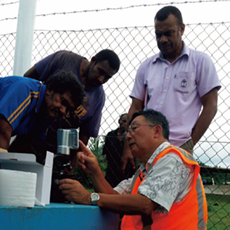
JICA Expert Dr. Nakamoto carrying out instruction on-site (Photo: JICA)
A JICA technical training participant from Fiji who participated in JICA's Knowledge Co-Creation Program “Management of Water Resources and Water Supply Services for Pacific Island Countries” took back the Ecological Purification System (EPS) taught in the program to Fiji and introduced it there. The EPS is a clean water system that uses a food chain mechanism of microscopic organisms, adopted in Miyakojima Island in Okinawa and elsewhere. As this water purification system does not use electrically-driven equipment, it is designed to be low cost as well as easy to operate and maintain, and thus it has a low environmental load. Fiji's Ministry of Infrastructure and Transport evaluated the EPS as a system suited to supply water in rural areas and requested Japan's cooperation with the aim of large-scale implementation of the system in rural areas.
On the basis of that request, in January 2013 Japan held a workshop in Suva as Follow-up Cooperation, and subsequently, since November 2014 Japan has been implementing support such as formulating plans related to the establishment of rural water supply systems that utilize EPS, the instruction of appropriate construction, operation and maintenance of EPS, and the preparation of manuals, by continuous presence of an individual expert of ongoing projects and Senior Volunteers dispatched from January 2015.
Though this project is on a small-scale, it combined schemes such as the Knowledge-Co-Creation Program, Follow-up Cooperation, individual experts and volunteers. Thus, so far EPS has been established in a total of more than 75 locations: 53 locations on Viti Levu Island and 22 locations on Vanua Levu Island. More than 20,000 people are benefiting from this, and in rural areas in Fiji where water supply infrastructure is undeveloped, this cooperation, which supplies safe water using EPS at a low cost and low environmental impact, is directly useful for villagers. It has also been highly appreciated by the Government of Fiji, which has made an allowance in this fiscal year's budget for EPS to be installed in additional 30 locations. This technology is highly adaptable and durable in various environments; therefore, further development of this cooperation is expected to make it possible to provide access to safe water in most of the target areas. (As of December 2017)
- Note 12: PIF member countries and regions: Australia, Cook, Federated States of Micronesia, Fiji, Kiribati, Marshall, Nauru, New Zealand, Niue, Palau, Papua New Guinea, Samoa, Solomon, Tonga, Tuvalu, Vanuatu, French Polynesia, and New Caledonia.
